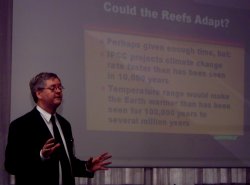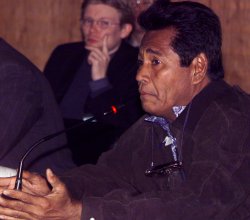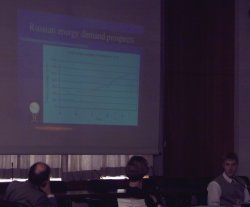 |
|
||||||||||||
 Saturday, October
30
Saturday, October
30
|
|||||||||||||
|
|
|||||||||||||
|
Climate change, coral bleaching and the future of the world's coral reefs Greenpeace International hosted this side event, which highlighted the threats to coral reefs due to climate change. Kevin Jardine, Greenpeace International, presented the findings of a recent Greenpeace-commissioned study, which used known bleaching temperature thresholds and the sea surface termperature projections generated by general circulation models from the Max Planck Institute and Australia's CSIRO to conclude that near-annual bleaching events may occur on most large reef systems within 70 years, while in some of the most vulnerable reefs, including those in the Caribbean, bleaching may occur annually within about 20 years. Jardine stressed that without immediate action to reduce GHG emissions, annual bleaching is expected to cause many reefs to die-off, with enormous implications for reef ecosystems, and the multi-billion dollar fishing and tourist industries that depend on them.
The Royal Institute of International Affairs (RIIA) in collaboration with the Centre for Energy Policy sponsored this event. Panelists included Michael Grubb and Christian Vrolijk, RIIA, Frank Joshua, UNCTAD, and Marina Martynova, Russian Centre for Foreign Investments. Christian Vrolijk discussed a recent workshop on Russian energy prospects and the implications for emissions and climate policy. The workshop resulted in improved understanding of the problems and challenges for Russian energy to date. He said that the problem of non-payment and the lack of investment in the energy sector had to be addressed, and that this would have serious implications for future energy consumption in Russia. He said that energy demand, which was currently about 30% below 1990 levels, would be between 10% higher and 20% lower than current levels by 2010. He said this would result in demand (and emissions)being substantially below 1990 levels even under the highest assumption. Marina Martynova and Frank Joshua reported on the results of a regional workshop on emissions trading for countries with economies in transition held in September in Moscow. The objective of the meeting was to increase awareness, share experiences and identify needs for capacity building. Issues addressed at the workshop included: a review of experiences with domestic and commercial emission trading initiatives; perspectives on the development of a plurilateral emissions trading system; key design aspects of allowance and credit trading systems; market entry strategies; and the role of organized markets in controlling GHG emissions. The workshop also included a commodity and auction market simulation, as well as an assessment of the capacity building needs for emissions trading in transition countries.
Uncertain inventories: Implications for the Kyoto Protocol In this side event, convened by the Verificaton Research Training Information Centre (VERTIC), Fiona Mullins addressed the implications of uncertainty in the calculation of GHG inventories for the Kyoto Protocol. Fiona Mullins can be contacted at Environmental Resources Management, Eaton House, Wallbrook Court, North Hinksey Lane, Oxford Ox2 0QS. E-mail: fxm@ermuk.com In our RealAudio presentation, Fiona Mullins of Environmental Resource Manangement notes that data quality in national emissions measurements will vary internationally according to local capacities for data collection. Mullins describes how variable data quality can affect Kyoto mechanisms, how emissions trading may affect and/or be affected by data quality, and proposes the establishment of a 'safety margin' in data collection and comparison to be used for trading purposes only.
|
|||||||||||||
| © 1999, Earth Negotiations Bulletin. All rights reserved. |
|
||||||||||||







